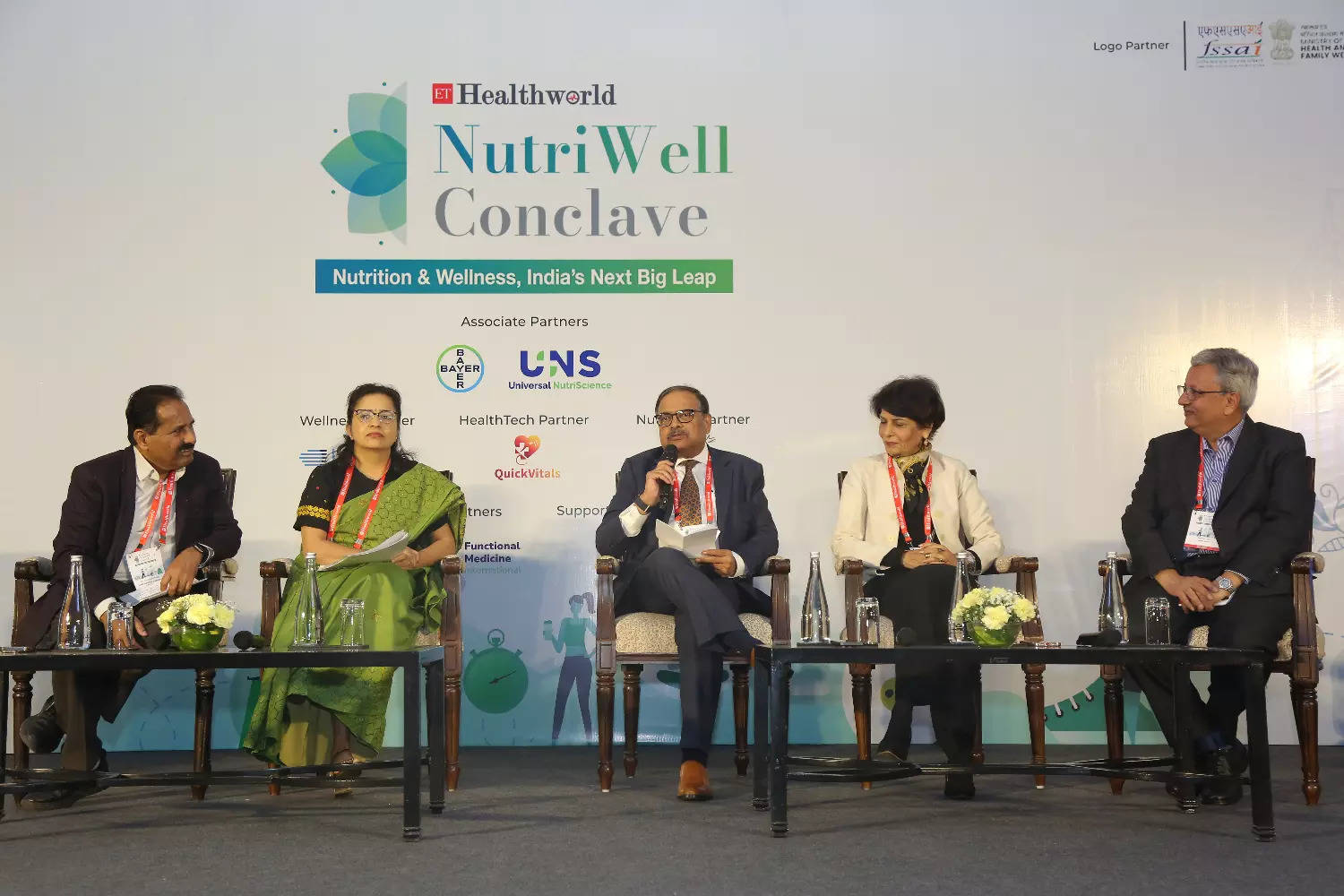
New Delhi: Having mitigated the shocks of the pandemic in record time compounded with the calls of further championing issues like TB and malaria eradication in the coming years, India’s healthcare ecosystem appears to be on the right track, but a myopic analysis also suggests that despite a series of relentless efforts, initiatives and investing a lion’ chunk of earmarked resources aimed at combating a multitude of maladies, the country has yet been able to achieve the desired outcomes.
So does this underscore the imperative to pivot from a predominantly curative paradigm to one that prioritises prophylactic measures? And on this path Is Nutrition India’s Next Big Leap.
To discuss this pressing topic ETHealthworld NutriWell Conclave convened a panel discussion where key policymakers, healthcare experts and nutritional influencers converged to voice their concerns, explore strategies to overcome them and discuss potential areas where the stakeholders need to focus for improving and expanding the efficacy and returns of healthcare initiatives.
The panellist for the session included Neeraj Jain, Country Director India & Director Growth Operations, Asia, Middle East & Europe (AMEE), PATH India; Ishi Khosla, Clinical Nutritionist, Columnist, Author; Dr Avula Laxmaiah, Scientist G (Director Grade Scientist) and Head, Public Health Nutrition, ICMR-NIN; Ruchika Chugh Sachdeva, Nutrition Lead, India Country Office, Bill and Melinda Gates Foundation; and C K Mishra, Former Union Secretary, MoHFW moderated the panel discussion.
Initiating the discussion Former Health Secretary and a big proponent of preventive care C K Mishra, attributing to the theme of discussion stressed that, even if we don’t want (to take a leap in nutrition) we have to do it because there is no option, we (India) has a strange situation where we are still struggling with communicable diseases and now facing the dual burden of non-communicable diseases (NCDs).”
According to the former policy maker, to ease out this burden the country certainly needs to move towards predictive options but for a country like India where 38 per cent of the total health expenditure is still spent on curative care deployment and utilisation of resources is a critical aspect.”
Voicing her remarks on the theme Ruchika Chugh Sachdeva, Nutrition Lead, India Country Office of Bill and Melinda Gates Foundation voiced, “Many states have taken steps to diversify their food baskets with the inclusion of pulses (currently 14), eggs (Bihar) so clearly intake has increased but we need to check whether it is increased in the right quantity or not because recent data reflects that, though the overall food expenditure has increased but the food consumption has reduced, so we (India) are moving in the positive direction but we still have a way to get there (ensuring quality nutrition to all citizens).”
Participating in the discussion, Clinical Nutritionist, Columnist & Author, Ishi Khosla, replied that, Nutrition is a relatively new branch of science due to which people at times confuse the concept of food and diet with it, however, food is much beyond the general perception of its calorific value, food is also about PH, phytonutrients etc. and experts suggest that there are around 300 health conditions which are connected with a leaky gut, hence nutrition is just one aspect of food. We need to factor in other influential factors to fix our gut health because unless and until we fix the gut we will not be able to find the solutions.”
For addressing the rising healthcare challenges, Dr Avula Laxmaiah, Scientist G (Director Grade Scientist) and Head, Public Health Nutrition, ICMR-NIN suggested, “Since we know the determinants, risk factors and magnitude of the problem now, this is the stage of intervention and that too in a sustainable manner. Currently, we already have some good ongoing programs but to make required corrections we don’t have any concurrent monitoring system.”
“Earlier it was difficult for each individual to afford three meals a day but now having achieved food security three decades ago, there is no problem with calorie intake but in-spite of this we are yet to achieve nutritional security because these meals are incapable of fulfilling the daily micro-nutrient requirement,” he flagged.
For making individual initiatives more effective Neeraj Jain, Country Director India & Director Growth Operations, Asia, Middle East & Europe (AMEE), PATH India echoed, “The initiatives led by non-profits or CSR driven campaigns needs to collaborate with the government to rollout their services in a large scale setting where 800 million people living in rural and semi-urban set-ups should be taken as the denominator.”
“But at the same time for problems like anemia we should adopt a micro approach by targeting single district and if that model succeeds we can replicate that to other ones and have to factor in the role of nutrition because without ensuring proper nutrition problems like TB, malaria and other vector-borne diseases are never going to be eliminated,” Jain concluded.







